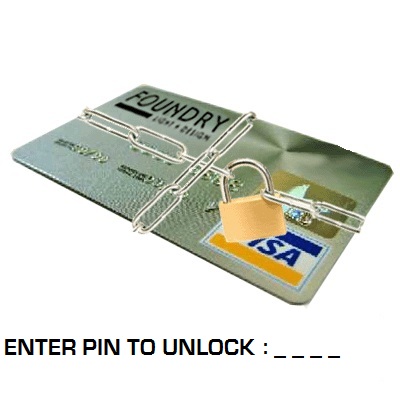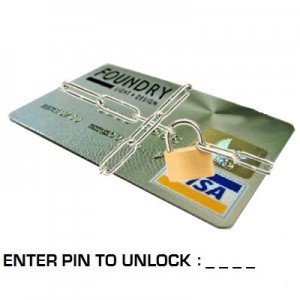
A personal identification number (PIN, pronounced “pin”; often erroneously PIN number) is a secret numeric password shared between a user and a system that can be used to authenticate the user to the system. Typically, the user is required to provide a non-confidential user identifier or token (the user ID) and a confidential PIN to gain access to the system. Upon receiving the user ID and PIN, the system looks up the PIN based upon the user ID and compares the PIN stored in its system with the PIN provided by the user. The user is granted access only when the number entered matches with the number stored. Hence, despite the name, a PIN does not personally identify the user.
PINs are most often used for automated teller machines (ATMs) but are increasingly used at the point of sale, for debit cards and credit cards. The concept of a PIN originates with the inventor of the ATM
In order to forestall any occurrence of Debit card fraud on your account as a result of poor safe keeping of your Personal Identification Number (PIN) as well as provide you with safe and convenient banking services. Here are some guides on how to keep your PIN safe:
- Do not choose an obvious PIN. Birth date, wedding anniversary, phone number and home address are obvious picks and should not be used. Instead, think of numbers unrelated to major events and addresses in your life to create your PIN.
- Use different PIN for different cards. Don’t keep the same PIN for all your cards, so that if you lose your wallet, it will be harder for the PINs to be cracked.
- Do not share your PIN. It is not good to trust a friend or a family member with your PIN. Circumstances may change, or the trusted person might be in a compromising position with a third party and be obliged to reveal your PIN under harassment or threat.
- Shield your PIN when using it. Use your hand, a cheque book, a piece of paper etc to shield your PIN as you enter it into the Automated Teller Machine (ATM) or Point of Sale Terminal (POS).
- Do not give out your PIN in response to e-mail or telephone requests. E-mails asking for your bank account details, verification codes, passwords and PINs should never be responded to. Do not also give anyone your PIN over the telephone; it might be a fraudulent request.
- Do not write your PIN down on the debit card or a conspicuous place. If you must write it down, disguise it in some way or put it somewhere totally unrelated to the card.
Be proactive. If you suspect any fraudulent activity using a debit card still in your possession, in addition to notifying the bank, change your PIN immediately.
Contact a closest bank branch immediately if your card is stolen or lost. This is to inform them to cancel the card immediately.
Knowledge reigns supreme, Stay informed!


